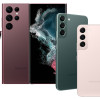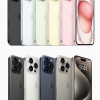Review: LG Chocolate
Though it is called the Chocolate, the VX8500 does not come in dark brown or creamy white like the Korean version, and looks more like a black iPod than a Hershey bar. Since we have never seen a glossy black chocolate bar in our lives, we will refrain from making any dessert or cooking related puns when discussing this phone.
When closed, the Chocolate looks less like a phone and more like an iPod knock-off. The only control visible on the sleek black rectangle is the circular D-pad, which is meant to look like the iPod's click wheel (though it doesn't act like one - more on that later.) The only indication that it might be a phone is the Verizon logo beneath the somewhat hidden screen.
The Chocolate is a rather narrow rectangle with gentle curved edges. The back of the phone is actually smaller than the front, so it sits deeper and more firmly in your hand. Between the narrow sides and the way it is designed to sit in your palm, the phone is easy to grip and easy to hold on to. Despite the fact that the Chocolate is incredibly glossy, it is not slippery at all.
When the Chocolate is closed and the keypad is locked, it doesn't look like much. The screen is dark, the lights that indicate where the capacitive (touch-sensitive) "buttons" are off and no camera is visible. But a press of a side key or sliding the phone open and the phone comes alive like the dashboard of a luxury car as it's being started.
The slide mechanism is spring assisted, so there is some resistance when starting to open the phone. Once you make it past that critical point, the Chocolate pops open - not violently, but smoothly and quickly. It sits just as comfortably in your hand open as it does closed since there are no harsh edges or protrusions. Since you can't grip the phone as tightly when it's open, it does feel like it's going to slip, but it hasn't fallen out of our hands yet.
Once the Chocolate is open, it springs to life. The crisp screen turns on, the lights that indicate where the buttons are light up and the camera - normally hidden behind the slide - is ready to use. Slid open with the keypad active, the Chocolate looks much more like a phone than when closed. But no one will ever say "that just looks like all the other phones," even when it is open.
Keypad
The face of the phone is packed with touch-sensitive buttons (using capacitive technology), though `buttons' may be the wrong word. Other than the circle and dividers which denotes the directions and select key of the D-Pad, there is no physical indication of any buttons. Believe it or not this is still an improvement over the original Chocolate, on which the only button physically marked was the D-Pad select - not even the direction keys could be felt out. The buttons, as well as the D-Pad are touch sensitive spots embedded in the hard surface of the phone, so they do not click or give you any other tactile feedback to let you know you've pressed one.
Though the D-pad is an improvement on the original design, it is still a disappointment. Verizon called the D-pad a clickwheel in some of their marketing materials, and the concentric ridges and certain interface elements - especially in the main menu - would indicate that you are supposed to run your finger around it like you do on an iPod. However it does not work like this at all. It works perfectly fine as a D-pad, but adding elements that give both tactile and visual cues that it is more is misleading. Every person who picked up our Chocolate and tried to use it, started using the D-pad as a scroll wheel. They were each confused when at first they saw the main menu moving, and then noticed it was only moving back and forth between two selections.
Around the D-pad are two soft keys at the top, and send and clear keys below. The send key actually looks like the end key, since it shows a receiver pointing down, or hung up. Thus one might mistake the futuristic looking C of the clear for the send key. When we asked novice users to try the Chocolate, many were confused by this. They were especially confused to find out the the end key is a side button, and a difficult one to find without the new on screen labels included in this latest version of the Verizon software. However once you start using the Chocolate, you find yourself rarely needing the end key. You will almost always end a call by shutting the slide, so about the only time you need to use the end key is to jump immediately back to the home screen.
There are six side buttons - 3 on each side and they are positioned symmetrically, so the buttons are directly across from each other in clusters at the center of each side. Because of the way they are positioned and grouped together, it is nearly impossible to hit a key on one side without hitting a key on the other. If you do not hit the key you wanted first, this will often prevent you from actually accomplishing the task you set out to do. Many times we accidently hit a volume button attempting to start the camera, only to find ourselves stuck in the volume adjustment screen missing an opportunity to take a picture.















 Samsung Refreshes Galaxy S Series with S Pen, New Cameras
Samsung Refreshes Galaxy S Series with S Pen, New Cameras
 Hands On with the Motorola edge+ (2022)
Hands On with the Motorola edge+ (2022)
 Hands On with Xplora Kids Smartwatches
Hands On with Xplora Kids Smartwatches
 iPhone 15 Series Goes All-In on USB-C and Dynamic Island
iPhone 15 Series Goes All-In on USB-C and Dynamic Island
 Samsung Galaxy A53 Coming to US in Two Weeks
Samsung Galaxy A53 Coming to US in Two Weeks
 LG VX-8500 Chocolate
LG VX-8500 Chocolate



